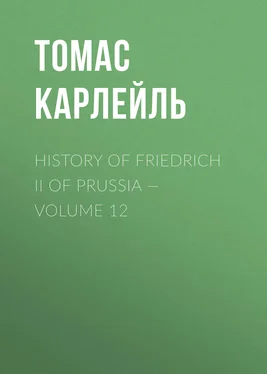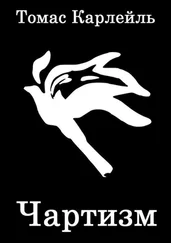Томас Карлейль - History of Friedrich II of Prussia — Volume 12
Здесь есть возможность читать онлайн «Томас Карлейль - History of Friedrich II of Prussia — Volume 12» — ознакомительный отрывок электронной книги совершенно бесплатно, а после прочтения отрывка купить полную версию. В некоторых случаях можно слушать аудио, скачать через торрент в формате fb2 и присутствует краткое содержание. Жанр: foreign_prose, История, literature_19, foreign_edu, foreign_antique, на английском языке. Описание произведения, (предисловие) а так же отзывы посетителей доступны на портале библиотеки ЛибКат.
- Название:History of Friedrich II of Prussia — Volume 12
- Автор:
- Жанр:
- Год:неизвестен
- ISBN:нет данных
- Рейтинг книги:3 / 5. Голосов: 1
-
Избранное:Добавить в избранное
- Отзывы:
-
Ваша оценка:
- 60
- 1
- 2
- 3
- 4
- 5
History of Friedrich II of Prussia — Volume 12: краткое содержание, описание и аннотация
Предлагаем к чтению аннотацию, описание, краткое содержание или предисловие (зависит от того, что написал сам автор книги «History of Friedrich II of Prussia — Volume 12»). Если вы не нашли необходимую информацию о книге — напишите в комментариях, мы постараемся отыскать её.
History of Friedrich II of Prussia — Volume 12 — читать онлайн ознакомительный отрывок
Ниже представлен текст книги, разбитый по страницам. Система сохранения места последней прочитанной страницы, позволяет с удобством читать онлайн бесплатно книгу «History of Friedrich II of Prussia — Volume 12», без необходимости каждый раз заново искать на чём Вы остановились. Поставьте закладку, и сможете в любой момент перейти на страницу, на которой закончили чтение.
Интервал:
Закладка:
Wallis is making strenuous preparation; forces the inhabitants, even the upper kinds of them, to labor day and night by relays, in his rampartings, palisadings; is for burning all the adjacent Villages,—and would have done it, had not the peasants themselves turned out in a dangerous state of mind. He has got together about 1,000 men. His powder, they say, is fifty years old; but he has eatable provender from Breslau, and means to hold out to the utmost. Readers must admit that the Austrian military, Graf von Wallis to begin with,—still more, General Browne, who is a younger man and has now the head charge,—behave well in their present forsaken condition. Wallis (Graf FRANZ WENZEL this one, not to be confounded with an older Wallis heard of in the late Turk War) is of Scotch descent,—as all these Wallises are; "came to Austria long generations ago; REICHSGRAFS since 1612:"—Browne is of Irish; age now thirty-five, ten years younger than Wallis. Read this Note on the distinguished Browne:—
"A German-Irish Gentleman, this General (ultimately Fieldmarshal) Graf von Browne; one of those sad exiled Irish Jacobites, or sons of Jacobites, who are fighting in foreign armies; able and notable men several of them, and this Browne considerably the most so. We shall meet him repeatedly within the next eighteen years. Maximilian-Ulysses Graf von Browne: I said he was born German; Basel his birthplace (23d October, 1705), Father also a soldier: he must not be confounded with a contemporary Cousin of his, who is also 'Fieldmarshal Browne,' but serves in Russia, Governor of Riga for a long time in the coming years. This Austrian General, Fieldmarshal Browne, will by and by concern us somewhat; and the reader may take note of him.
"Who the Irish Brothers Browne, the Fathers of these Marshals Browne, were? I have looked in what Irish Peerages and printed Records there were, but without the least result. One big dropsical Book, of languid quality, called King James's Irish Army-List, has multitudes of Brownes and others, in an indistinct form; but the one Browne wanted, the one Lacy, almost the one Lally, like the part of HAMLET, are omitted. There are so many Irish in the like case with these Brownes. A Lacy we once slightly saw or heard of; busy in the Polish-Election time,—besieging Dantzig (investing Dantzig, that Munnich might besiege it);—that Lacy, 'Governor of Riga,' whom the RUSSIAN Browne will succeed, is also Irish: a conspicuous Russian man; and will have a Son Lacy, conspicuous among the Austrians. Maguires, Ogilvies (of the Irish stock), Lieutenants 'Fitzgeral;' very many Irish; and there is not the least distinct account to be had of any of them." [For Browne see "Anonymous of Hamburg" (so I have had to label a J.F.S. Geschichte des &c. —in fact, History of Seven-Years War, in successive volumes, done chiefly by the scissors; Leipzig and Frankfurt, 1759, et seqq.), i. 123-131 n.: elaborate Note of eight pages there; intimating withal that he, J.F.S., wrote the "Life of Browne," a Book I had in vain sought for; and can now guess to consist of those same elaborate eight pages, PLUS water and lathering to the due amount. Anonymous "of Hamburg" I call my J.F.S.,—having fished him out of the dust-abysses in that City: a very poor take; yet worth citing sometimes, being authentic, as even the darkest Germans generally are.—For a glimpse of LACY (the Elder Lacy) see Busching, Beitrage, vi. 162.—For WALLIS (tombstone Note on Wallis) see (among others who are copious in that kind of article, and keep large sacks of it, in admired disorder) Anonymous Seyfarth, Geschichte Friedrichs des Andern (Leipzig, 1784-1788), i. 112 n.; and Anonymous, Leben der &c. Marie Theresie (Leipzig, 1781), 27 n.: laboriously authentic Books both; essentialy DICTIONARIES,—stuffed as into a row of blind SACKS.]
Let us attend his Majesty on the next few marches towards Glogau, to see the manner of the thing a little; after which it will behoove us to be much more summary, and stick by the main incidents.
MARCH TO WEICHAU (SATURDAY, 17th, AND STAY SUNDAY THERE); TO MILKAU (MONDAY, 19th); GET TO HERRENDORF, WITHIN SIGHT OF GLOGAU, DECEMBER 22d
Friedrich's march proceeds with speed and regularity. Strict discipline is maintained; all things paid for, damage carefully avoided: "We come, not as invasive enemies of you or of the Queen of Hungary, but as protective friends of Silesia and of her Majesty's rights there;—her Majesty once allowing us (as it is presumable she will) our own rights in this Province, no man shall meddle with hers, while we continue here." To that effect runs the little "Patent," or initiatory Proclamation, extensively handed out, and posted in public places, as was said above; and the practice is conformable. To all men, coming with Protests or otherwise, we perceive, the young King is politeness itself; giving clear answer, and promise which will be kept, on the above principle. Nothing angers him except that gentlemen should disbelieve, and run away. That a mansion be found deserted by its owners, is the one evil omen for such mansion. Thus, at the Schloss of Weichau (which is still discoverable on the Map, across the "Black Ochel" and the "White," muddy streams which saunter eastward towards, the Oder there, nothing yet running westward for the Bober, our other limitary river), next night after Schweinitz, second night in Silesia, there was no Owner to be met with; and the look of his Majesty grew FINSTER (dark); remembering what had passed yesternight, in like case, at that other Schloss from which the owner with his best portable furniture had vanished. At which Schloss, as above noticed, some disorders were committed by angry parties of the march;—doors burst open (doors standing impudently dumb to the rational proposals made them!), inferior remainders of furniture smashed into firewood, and the like,—no doubt to his Majesty's vexation. Here at Weichau stricter measures were taken: and yet difficulties, risks were not wanting; and the AMTMANN (Steward of the place) got pulled about, and once even a stroke or two. Happily the young Herr of Weichau appeared in person on the morrow, hearing his Majesty was still there: "Papa is old; lives at another Schloss; could not wait upon your Majesty; nor, till now, could I have that honor."—"Well; lucky that you have come: stay dinner!" Which the young Count did, and drove home in the evening to reassure Papa; his Majesty continuing there another night, and the risk over. [ Helden-Geschichte, i. 459.]
This day, Sunday, 18th, the Army rests; their first Sunday in Silesia, while the young Count pays his devoir: and here in Weichau, as elsewhere, it is in the Church, Catholic nearly always, that the Heretic Army does its devotions, safe from weather at least: such the Royal Order, they say; which is taken note of, by the Heterodox and by the Orthodox. And ever henceforth, this is the example followed; and in all places where there is no Protestant Church and the Catholics have one, the Prussian Army-Chaplain assembles his buff-belted audience in the latter: "No offence, Reverend Fathers, but there are hours for us, and hours for you; and such is the King's Order." There is regular divine-service in this Prussian Army; and even a good deal of inarticulate religion, as one may see on examining.
Country Gentlemen, Town Mayors and other civic Authorities, soon learn that on these terms they are safe with his Majesty; march after march he has interviews with such, to regulate the supplies, the necessities and accidents of the quartering of his Troops. Clear, frank, open to reasonable representation, correct to his promise; in fact, industriously conciliatory and pacificatory: such is Friedrich to all Silesian men. Provincial Authorities, who can get no instructions from Head-quarters; Vienna saying nothing, Breslau nothing, and Deputy-Governor Browne being far south in Neisse,—are naturally in difficulties: How shall they act? Best not to act at all, if one can help it; and follow the Mayor of Grunberg's unsurpassable pattern!—
Читать дальшеИнтервал:
Закладка:
Похожие книги на «History of Friedrich II of Prussia — Volume 12»
Представляем Вашему вниманию похожие книги на «History of Friedrich II of Prussia — Volume 12» списком для выбора. Мы отобрали схожую по названию и смыслу литературу в надежде предоставить читателям больше вариантов отыскать новые, интересные, ещё непрочитанные произведения.
Обсуждение, отзывы о книге «History of Friedrich II of Prussia — Volume 12» и просто собственные мнения читателей. Оставьте ваши комментарии, напишите, что Вы думаете о произведении, его смысле или главных героях. Укажите что конкретно понравилось, а что нет, и почему Вы так считаете.









